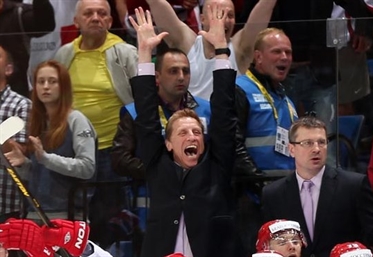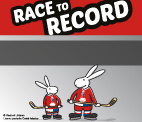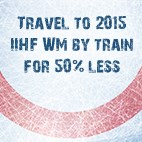Hanlon talks Belarus, Swiss
Hanlon talks Belarus, Swiss
“There was no way we could not play our best”

 Head Coach Glen Hanlon cheers as Belarus scores against Latvia to reach the 2014 IIHF Ice Hockey World Championship quarter-finals on home ice in Minsk. Photo: Andre Ringuette / HHOF-IIHF Images
Head Coach Glen Hanlon cheers as Belarus scores against Latvia to reach the 2014 IIHF Ice Hockey World Championship quarter-finals on home ice in Minsk. Photo: Andre Ringuette / HHOF-IIHF Images
Hanlon managed to guide the team from the brink of relegation last year all the way to the quarter-finals in Minsk. He talked with IIHF.com about the 2014 IIHF Ice Hockey World Championship on home ice and his new job in Switzerland ahead of the 2015 IIHF Ice Hockey World Championship in the Czech Republic.
You’re the most successful coach in Belarusian World Championship history leading the team to the quarter-finals for the third time. Were you surprised about the team’s performance in Minsk considering the difficult years before?
I was not surprised. I felt before the tournament all teams could beat all teams. I knew it would be close and we would need some luck. We had tremendous leadership from our veteran players. They handled the home pressure extremely well. Our young defencemen that we added at the end from North America had a level of confidence that made our team believe.
How big was the home-ice advantage for the team? Did it change something for you and for team operations?
The pressure of home ice can help or hurt you. I think in the first game it was difficult for us to relax and play. After our second game, which we won, we started to enjoy our situation of playing at home. There were times in the tournament when we had so much support there was no way we could not play our best. In the end home ice was an advantage and I know all the players will remember being on the ice for the World Championship in Belarus as one of their top moments in hockey.
Continue readingMinsk set a new all-time attendance record. Did you feel all the euphoria and festivities of Belarusian and foreign fans in the city?
For sure I felt it. I was in the city the whole year leading up to the tournament and there was much preparation and talk about the tournament. I do not think the world realized how important hockey is to the people of Belarus. It is the same in Belarus as all the leading hockey countries. I knew the Belarusian people could hardly wait for the hockey fans to arrive. The organizing committee and all the volunteers worked hard to make everything run smoothly.
What was the key to success for the team to over-perform in Minsk?
We played the ultimate team game. Our top offensive players worked hard defensively. Everyone questioned our defence before the tournament and they took the challenge and played top level hockey. On defence Vladimir Denisov came to the top and gave us leadership and a defenceman that could play 25 minutes.
We got two strong highly pressure games from Vitali Koval. When he became ill Kevin Lalande came in and played spectacular. He worked very hard to stay prepared for the tournament and when he got his chance he grabbed the starting position and kept it. Part way through the tournament the line of Kaluzhny, Grabovski and Sergei Kostitsyn gave us one of the top lines in the tournament and were always a threat. Also, we got some very timely goals from Andrei Stepanov. The main thing was by the end of the tournament everyone played their role and accepted it.
With hockey being a national sport and the President in attendance at the games it was surely more than a normal World Championship for the players and staff. How did you feel this pressure and how did you deal with it?
This is the same situation for all home teams in World Championships. I told myself and the players all year that we could use the situation or the situation can use us. The leaders did a remarkable job in helping everyone to be excited, play hard and accept the outcome as men.
What was the most special moment for you at Minsk Arena and off the ice during the Worlds in Minsk?
For sure it was on the bench after the win vs. Latvia to put us in the quarter-finals. I have never heard an arena that loud.
Knowing Minsk well for many years, what did you think about the atmosphere in the city and how Minsk and its people presented themselves to the world? Did the World Championship change something?
I knew it would be great. The city is very clean, safe and beautiful. People asked “is it like this only for the tournament?” The answer is no. They work hard to keep the city like this all the time. It also gets better every year.
In Minsk it also became known that you would leave the team and take over the Swiss national team. Why did you decide to leave?
I had decided to leave long before the tournament. There were many reasons for this decision. Some were hockey and some were family reasons. Not one reason was personal. My coaching staff of Eduard Zankovets and Oleg Mikulchuk were good friends and a strong support voice for me. Our off-ice staff of medical and equipment managers were all friends and they worked very hard to make everything perfect. I also enjoyed my relationship with the Belarusian players. All of us had been together for many years.
Some things were difficult. Part of my job was to help with the U20 program and with other coaches. My lack of being able to communicate in Russian made this difficult. The development of the U20 program in Belarus is the most important situation and I thought it would be more productive if the head coach could speak Russian so there would be better lines of communication.
Working in the federation office every day put added work on the staff to help me so I could do normal every day activities. They were all great, but I felt that it was not fair to a busy group to make even more demands on them.
The last point is the most important point. My son is at a very important age in his life with regards to schooling and parenting. We needed to be together as a family and he needs the best schooling options that we could provide. We decided this before the opportunity came in Switzerland. When the opportunity came to go to Switzerland all of these concerns were taken care of. The opportunity to be involved with the U20 program is highly motivating. It is important for me to learn German, but for now speaking English is easier and I can communicate to more people without the help of an interpreter.
In the midst of your World Championship campaign the information leaked that you were in discussion with the Swiss Ice Hockey Federation. How did you react and deal with the situation? Did it cause trouble for you?
I had built up a very strong relationship with my players. This allows for things like this to happen and you can talk it over. I discussed the situation with two of my leadership group that have good English skills. I let them know that if there were any problems that I would gladly discuss them with the team. They said there were no problems and they hardly even discussed it. For this reason it did not cause me any trouble.
You will take over a Swiss national team that sensationally won silver in 2013 but failed to reach the quarter-finals in both Sochi and Minsk. Where would you realistically place the team among the top hockey nations and what are your goals for the upcoming years with the team?
There is a very small window between winning and losing in the World Championship. I like how the World Ranking works because it is an accumulation of points over a period of time. We are in the right grouping of teams. Sean Simpson did a good job of expanding the pool of players to pick from to play in the top tournaments. The U18 and U20 teams continue to develop and see success. The domestic league continues to get better with good coaching and strong ownership groups. These are all important factors. The most important thing in my mind is a strong domestic men’s championship to develop your players to play at a high level to prepare them for the top competition in the world. My goals are both short term and long term. The short term ones are the important ones. First is to meet the players and start to build relationships with them and for them to get to know me and what I expect. Then our U20 camp starts in early July. I need to meet our future players and establish our trademarks that will define our team.
The slogan of your introduction to the Swiss media was “welcome on board” on a Lake Zurich cruise. How does it feel to be at the helm of the Swiss national team program and what were your impressions during your first stay?
It was a fun day and a unique idea for a press conference. I think everyone enjoyed it. Our federation is very organized and detail oriented. Everything was is perfect order, which made my short stay highly productive.
You can tell that they enjoy working with each and they are a strong team behind the teams we put on the ice. Having a group like this makes coaching easier. Every detail is taken care of before the players arrive. It allows players and coaches to focus all their attention to on ice. The off-ice staff plays a major role in creating team harmony. We have a good staff and I look forward to moving forward and working with them. The city of Zurich is beautiful, but I knew this in advance. My family looks forward to the move and embracing Swiss culture.
What will be the next steps with the Swiss national team? Will you move to Switzerland permanently?
Our move is permanent. This is now our new home and my family looks forward to the move. I arrive the last week of July and my wife and son arrive in early August. My wife will take a leave from her work as a school teacher. My son is pumped to join a new hockey program and hit the slopes in the Swiss Alps. The next step is to accommodate my family’s needs regarding housing and schooling. We have an important U20 camp and our men’s kick-off weekend with players and sponsors is at the end of July.
My first priority is to make contact with our players. I’m now watching games from last year’s NLA season and national team games to form evaluations on how I can effectively use our players. I’m getting help with this from my assistant John Fust. He has a wealth of experience with the players. Our office is in Zurich and my son’s school and hockey is in the Zug area. I will look to live in the Zug area.
Switzerland had coaches who shaped the team over a long time span with Ralph Krueger and Sean Simpson. What will the team and its playing style look like in the upcoming years under you?
These coaches worked hard to put together an exciting team. The Swiss domestic league is quick and fun to watch. For these reasons I need to continue to make these the qualities of the Swiss team. I need to keep developing these strengths and work to add a few of my own qualities that I strongly believe in. These two great coaches have laid a foundation and built upon that foundation. Now I must continue to keep adding blocks to allow the players to play at their highest level and feel the thrill of a successful team.
Back to Overview























































































